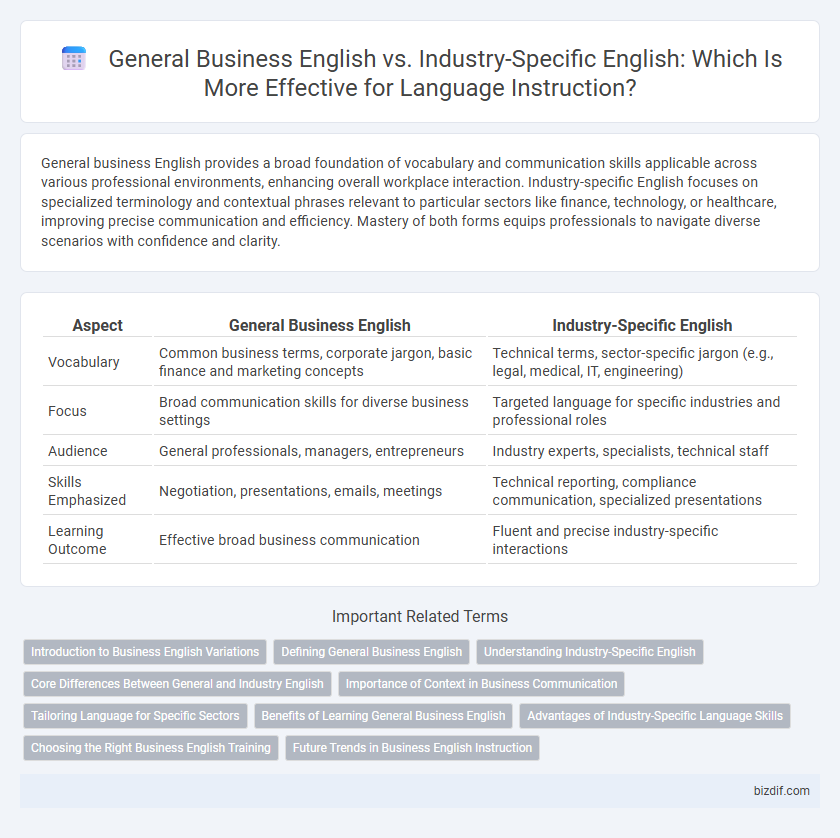General business English provides a broad foundation of vocabulary and communication skills applicable across various professional environments, enhancing overall workplace interaction. Industry-specific English focuses on specialized terminology and contextual phrases relevant to particular sectors like finance, technology, or healthcare, improving precise communication and efficiency. Mastery of both forms equips professionals to navigate diverse scenarios with confidence and clarity.
Table of Comparison
| Aspect | General Business English | Industry-Specific English |
|---|---|---|
| Vocabulary | Common business terms, corporate jargon, basic finance and marketing concepts | Technical terms, sector-specific jargon (e.g., legal, medical, IT, engineering) |
| Focus | Broad communication skills for diverse business settings | Targeted language for specific industries and professional roles |
| Audience | General professionals, managers, entrepreneurs | Industry experts, specialists, technical staff |
| Skills Emphasized | Negotiation, presentations, emails, meetings | Technical reporting, compliance communication, specialized presentations |
| Learning Outcome | Effective broad business communication | Fluent and precise industry-specific interactions |
Introduction to Business English Variations
Business English varies significantly between general usage and industry-specific applications, each requiring tailored vocabulary and communication styles. General Business English focuses on universal terms related to management, marketing, and finance, essential for broad workplace interactions. Industry-specific English incorporates specialized terminology and scenarios, enhancing clarity and effectiveness in fields like law, technology, or healthcare.
Defining General Business English
General Business English encompasses language skills and terminology commonly used across various professional settings, enabling clear communication in meetings, emails, presentations, and negotiations. It focuses on broad vocabulary and grammar patterns relevant to everyday office interactions, financial discussions, marketing basics, and customer relations. Mastery of General Business English serves as a foundation for learners before specializing in industry-specific language tailored to sectors like finance, technology, or healthcare.
Understanding Industry-Specific English
Understanding industry-specific English enhances communication by incorporating terminology and jargon unique to a particular sector, such as finance, healthcare, or technology. Mastery of this specialized vocabulary improves clarity in professional interactions, enabling more precise discussions and decision-making within the industry. This targeted language proficiency often leads to better job performance and increased credibility among industry peers.
Core Differences Between General and Industry English
General business English emphasizes broad communication skills, including email writing, presentations, negotiations, and meetings applicable across various sectors. Industry-specific English incorporates specialized terminology, jargon, and technical vocabulary unique to fields like finance, healthcare, or technology, enhancing precision and clarity in professional interactions. The core difference lies in the scope; general business English fosters versatile communication, while industry-specific English targets expertise in semantic nuances and contextual relevance within a particular industry.
Importance of Context in Business Communication
General business English provides fundamental language skills applicable across diverse industries, enhancing overall communication efficiency. Industry-specific English incorporates specialized terminology and context, ensuring precise and relevant interactions within particular sectors such as finance, healthcare, or technology. Mastery of context-driven language enhances clarity, reduces misunderstandings, and fosters effective professional relationships in dynamic business environments.
Tailoring Language for Specific Sectors
Tailoring language instruction to specific sectors enhances communication effectiveness by focusing on relevant vocabulary, industry jargon, and contextual scenarios unique to each field. General business English covers broad workplace skills like email writing and meeting etiquette, while industry-specific English targets specialized terms and practices in areas such as finance, healthcare, or technology. Customizing lessons to sector needs improves learners' confidence and proficiency in real-world professional interactions.
Benefits of Learning General Business English
Learning General Business English enhances overall communication skills applicable across various professional settings, fostering better networking and collaboration opportunities. It builds a strong foundation in essential vocabulary, formal writing, and presentation techniques crucial for diverse corporate environments. Mastery of general business language increases adaptability, making it easier to learn industry-specific terminology later.
Advantages of Industry-Specific Language Skills
Industry-specific English enhances communication accuracy by incorporating terminology and concepts unique to fields such as finance, healthcare, or technology, reducing misunderstandings and boosting professional credibility. Tailored language skills improve efficiency in workplace interactions, facilitating clearer negotiations, presentations, and technical documentation that align with industry standards. Mastery of sector-specific vocabulary also increases career advancement opportunities by meeting employer demands for specialized expertise.
Choosing the Right Business English Training
Choosing the right business English training involves assessing the specific needs of professionals, whether general business English or industry-specific English is more suitable. General business English focuses on broad skills like email writing, presentations, and meetings, enhancing overall communication across various sectors. Industry-specific English provides specialized vocabulary and scenarios tailored to fields like finance, healthcare, or technology, ensuring relevance and applicability in professional contexts.
Future Trends in Business English Instruction
Future trends in business English instruction emphasize personalized learning paths, integrating AI-driven tools to tailor content for general business English and industry-specific terminology. Emphasis on digital communication skills, cross-cultural competence, and real-time business scenarios enhances practical language usage. Emerging technologies, such as virtual reality and adaptive learning platforms, foster immersive and interactive experiences that bridge theoretical knowledge and industry-specific applications.
General business English vs industry-specific English Infographic

 bizdif.com
bizdif.com